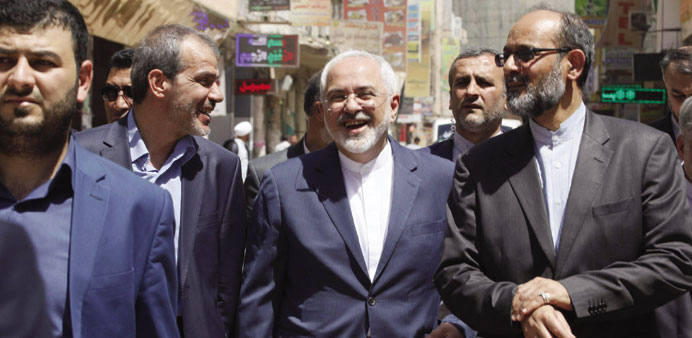Iranian Foreign Minister Mohamed Javad Zarif and Iran’s ambassador to Iraq Hassan Danaifar (second left) walk during a visit to Najaf yesterday.
AFP/Riyadh
Saudi Arabia’s foreign minister yesterday denounced “aggressive statements” by Iran, after Tehran accused Bahrain of stoking Gulf tensions by making unfounded allegations against it.
“This is unacceptable to us,” Foreign Minister Adel al-Jubeir said at a joint news conference with visiting EU foreign policy chief Federica Mogherini.
On Sunday, Iranian foreign ministry spokeswoman Marzieh Afkham accused Bahrain of making “unfounded allegations” aimed at creating “tension in the region”, after the interior ministry in Manama said it had detained two men accused of trying to smuggle weapons from Iran.
“This does not represent the intentions of a country seeking good relations,” Jubeir said of the Iranian statements.
“These statements are escalating and they are many.”
Iranian Foreign Minister Mohamed Javad Zarif denied, during a visit on Sunday to Kuwait, as “baseless” Bahrain’s claims that it had detained two men for trying to smuggle weapons from Iran.
“I openly say the claims are totally wrong,” he said.
“The timing of the announcement is an attempt to prevent any progress in co-operation between Iran and other Gulf states,” Zarif said.
Mogherini held talks in Riyadh yesterday to explain the agreement she helped broker on Iran’s nuclear programme, and to push for an end to Yemen’s war.
Today she flies to Iran to discuss implementation of the July 14 Vienna agreement that seeks to curb any Iranian attempt to get an atomic bomb.
The European Union played a leading role in years of talks between Britain, China, France, Russia, the United States, Germany and Iran. US Defence Secretary Ashton Carter visited Saudi Arabia to discuss the deal last week.
Mogherini has hailed the agreement as a “sign of hope for the entire world”.
“She believes it’s a good deal and should be welcomed,” a European diplomatic source said ahead of her Riyadh visit.
The accord requires Iran to curb its nuclear capabilities including the number of uranium centrifuges.
International monitors will supervise the process, and in exchange an embargo that has crippled Iran’s economy will be eased.
The deal would see Iran’s oil exports gradually resume and billions of dollars in frozen assets unblocked.
Last week, Jubeir said the agreement appeared to have effective safeguards, including an inspection mechanism as well as a provision to reinstate sanctions if world powers feel Iran has not met its commitments.
But he said Tehran’s support for regional “terrorism” remained a concern.
The diplomatic source said there was “a need for a political solution” in Yemen, another subject to be raised during Mogherini’s visit.
“Maybe the latest developments on the ground will make this easier,” the source said.
Iran-backed Houthi rebels, aided by forces loyal to former president Ali Abdullah Saleh, advanced from their traditional northern stronghold in Yemen last year.
They seized territory and moved on the southern city of Aden where internationally supported President Abd-Rabbu Mansour Hadi took refuge.
He fled to Saudi Arabia, which assembled an Arab coalition that began bombing the Houthis in late March.
Anti-rebel fighters on the ground last week regained control of much of Aden.
The coalition unilaterally announced a five-day truce so aid can reach a country facing what the United Nations has described as an “unfolding humanitarian catastrophe”.
The diplomatic source said Mogherini would also discuss Syria and Iraq, where Islamic State group militants have seized territory and carried out widespread atrocities.
European nations, Saudi Arabia and other Arab states are part of a US-led military coalition against IS, a group which has inspired attacks in Europe as well as in the kingdom.
Differences can be resolved through dialogue, says Zarif
Iranian Foreign Minister Mohamed Javad Zarif said during a visit to Baghdad yesterday that Tehran would like to clear up its political differences with the countries in the region.
“In Yemen and Syria we have differences with some of our neighbours, but we can solve them in a common dialogue,” Zarif told Mehr news agency.
On the first stage of his regional tour, Zarif has visited Kuwait, Qatar and Iraq over the last three days.
The aim of his trip is to explain the nuclear deal that Iran reached recently with the international community.
Zarif also said that Iran would maintain its policies on Syria and Yemen, continuing to offer support to Syrian President Bashar al-Assad and the Houthi rebels in Yemen.

